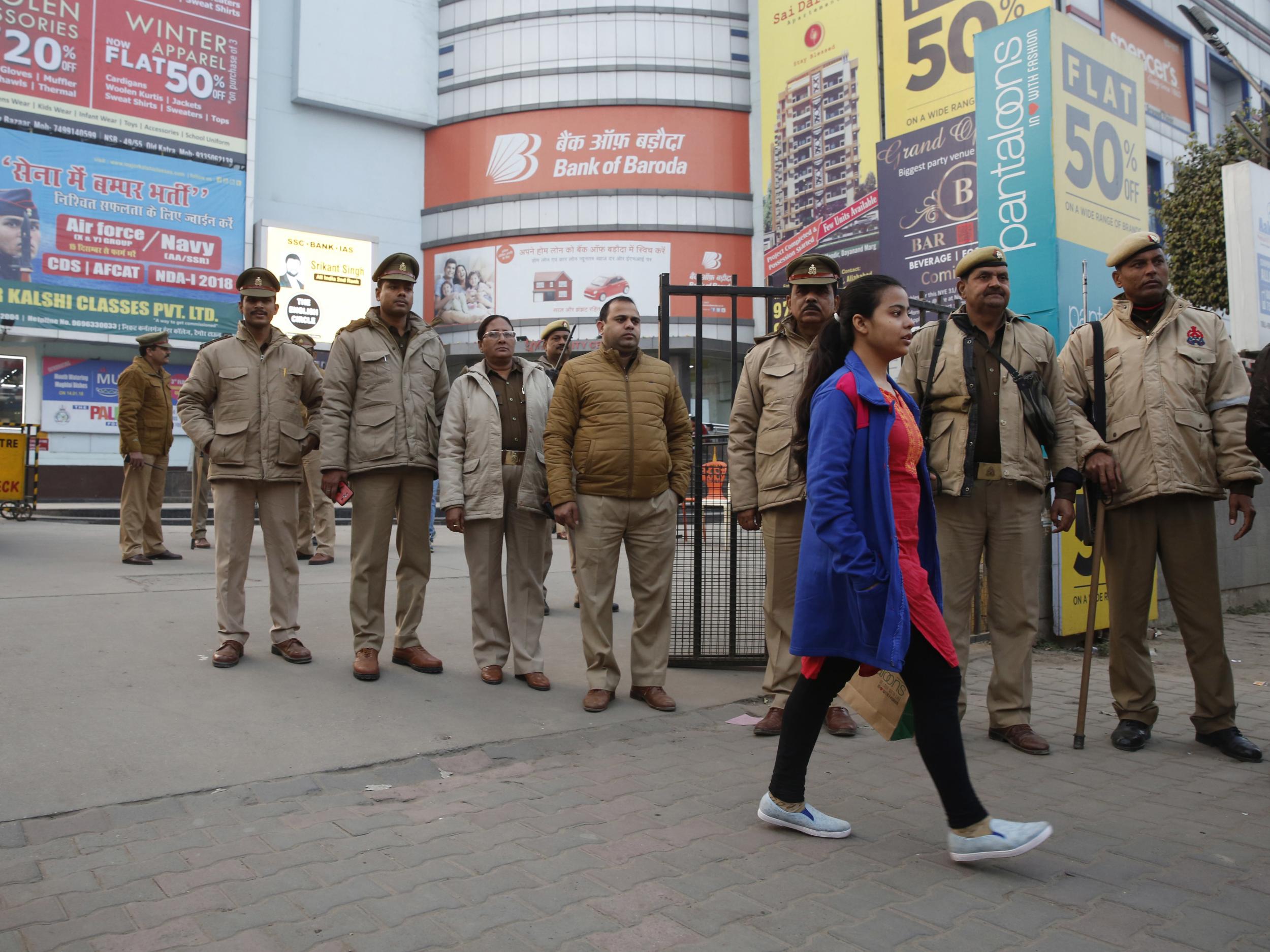Padmaavat: Controversial Bollywood film opens amid heavy security
Rumours movie contained interfaith romance between Hindu queen and Muslim invader sparked outrage, death threats and political grandstanding across India

Your support helps us to tell the story
From reproductive rights to climate change to Big Tech, The Independent is on the ground when the story is developing. Whether it's investigating the financials of Elon Musk's pro-Trump PAC or producing our latest documentary, 'The A Word', which shines a light on the American women fighting for reproductive rights, we know how important it is to parse out the facts from the messaging.
At such a critical moment in US history, we need reporters on the ground. Your donation allows us to keep sending journalists to speak to both sides of the story.
The Independent is trusted by Americans across the entire political spectrum. And unlike many other quality news outlets, we choose not to lock Americans out of our reporting and analysis with paywalls. We believe quality journalism should be available to everyone, paid for by those who can afford it.
Your support makes all the difference.There was anger about a rumoured romance between a Hindu queen and a Muslim invader. There were death threats. There were buses burnt and grandstanding politicians.
But when the Indian film Padmaavat was finally released on Thursday amid heavy security and breathless TV coverage, Bollywood’s latest over-the-top offering turned out to be just that: an opulent period drama with multiple songs and dances, a thin story line and not the slightest hint of the rumoured relationship.
At a theatre in the Indian capital, dozens of policemen and even a few armed paramilitary troops were posted outside. There were no posters announcing the release and fewer than 100 people watched the film in a theatre built for a thousand viewers.
The film is based on a 16th-century epic Sufi poem, Padmavat, in which a brave and beautiful Rajput queen chooses to immolate herself in a ceremonial fire rather than be captured by the Muslim sultan of Delhi, Allaudin Khilji.
Over centuries of retelling, the epic has come to be seen as history, despite little evidence. The main character of Queen Padmini has become an object of veneration for many Rajputs, the clans of former warriors and kings from the western state of Rajasthan.
And that is where the film’s many woes originated.
Rumours, denied multiple times by the film’s producer and director Sanjay Leela Bhansali, swirled that the film depicted a romantic dream sequence between the invading sultan and the queen of legendary beauty he madly coveted. As it happens, Queen Padmini and Khilji, the sultan, never interact in the film and are in the same frame for just a few seconds.
The film’s sets were vandalised several times by Rajput groups over the last year and Bhansali was manhandled by a mob.
Members of several small Rajput groups continued to be enraged about the film despite Bhansali’s protestations.
They kept finding reasons to be enraged.
The film’s trailer showed the queen and her female companions dancing during a religious celebration, which angered some protesters. A demure Rajput queen would never be seen dancing in public. In fact, in the film she is seen dancing only in front of her husband.

Watch Apple TV+ free for 7 days
New subscribers only. £8.99/mo. after free trial. Plan auto-renews until cancelled

Watch Apple TV+ free for 7 days
New subscribers only. £8.99/mo. after free trial. Plan auto-renews until cancelled
Others were angry that during the dance her bare midriff was visible briefly – so the filmmakers used special effects to cover her up.
As the film’s initial release date of 1 December inched closer, the threats grew and spread outside Rajasthan.
In November, Suraj Pal Amu, a member of India’s ruling Bharatiya Janata Party from the northern state of Haryana, offered 100m rupees (£1.1m) to anyone who beheaded Bhansali and lead actress Deepika Padukone.
The head of the Rajput Karni Sena in Rajasthan said Padukone should have her nose cut off – a symbol of public humiliation – for being in a film that he said insulted the famed queen.
Four Indian states, all ruled by the Hindu nationalist BJP, said they would ban the film because it hurt local sentiments.
For a while it appeared the film would never be released.
The producers scrambled to save their expensive extravaganza. A group that included representatives of India’s former Rajput royal families watched the film before the country’s censor board gave it the green light. They changed the name from Padmavati, one of the names of the queen.
They issued full-page disclaimers in every national newspaper, insisting the film paid homage to the valour of the brave queen and the heroic history of the Rajputs.
India’s top court had to step in and order the states of Madhya Pradesh, Gujarat, Rajasthan and Haryana to reverse their bans.
But the violence continued up until Thursday, with protesters setting buses on fire, damaging some theatres ahead of the release and blocking many national highways.
Several theatre owners didn’t screen the film for fear of vandalism.
S Prema Swarupa, a 21-year-old college student who braved the early winter chill and fears of violence to watch the film in New Delhi, was puzzled by the protests.
“I was definitely scared there would be violence but I can’t understand at all what all the protests have been about. There’s nothing in this film,” he said.
“It was all for nothing.”
AP
Join our commenting forum
Join thought-provoking conversations, follow other Independent readers and see their replies
Comments